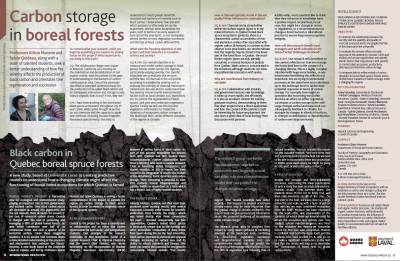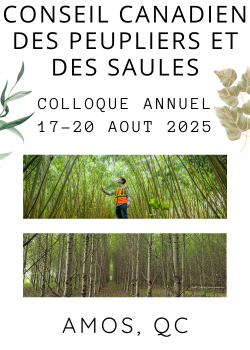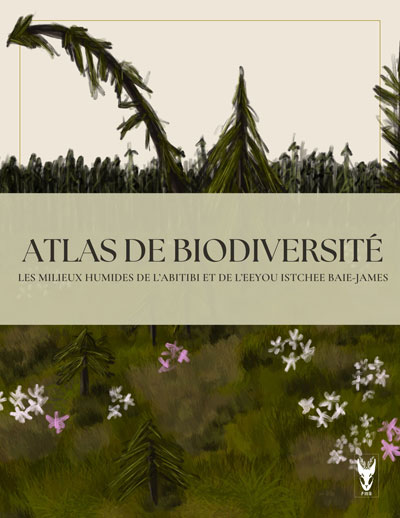
Alison Munson
Regular member
Forest Biogeochemistry
Professeure à la retraite
Université Laval
Faculté de foresterie et géomatique
Département des Sciences du bois et de la forêt
Pavillon Abitibi-Price
2405 rue de la Terrasse
Québec, Québec, Canada, G1V 0A6
Department Page ![]() | Google Scholar
| Google Scholar ![]() | Research Gate
| Research Gate ![]() || Mastodon
|| Mastodon ![]()
Home |
Academic background |
Research Interests
Teaching
Administration
Recent findings |
Former grads |
Publications
WELCOME!
ACADEMIC BACKGROUND
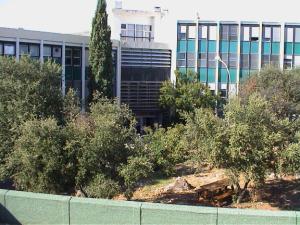
Sabbatical lab in 2007-08, CEFE
- Visiting researcher, Centre d'Écologie Fonctionnelle et Évolutive, Montpellier 2007-08
Restoration ecology, carbon dynamics in forest ecosystems - Visiting researcher, University of British Columbia, Faculty of Forestry 1998-99
- Professor of forest ecology and biogeochemistry 1991- (Université Laval)
- NSERC Postdoctoral studies 1989-1991 (Université Laval)
Biogeochemistry of plantations subject to intensive silviculture (Petawawa Research Forest) - PhD, Forest Ecology and Biogeochemistry 1989 (University of Toronto)
Site-specific growth and nutrition of black spruce in the Ontario Clay Belt - Research professional, Ecological forest classification, Agriculture Canada, Guelph 1980-83
- B.Sc. in Agriculture (Natural Resources Management) 1980 (University of Guelph)
RESEARCH THEMES
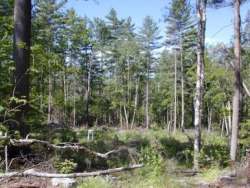
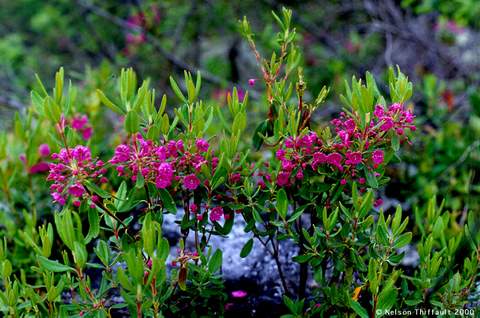
Photo : Nelson Thiffault
- Stabilisation of carbon in forest soils
- Plant functional traits and ecosystem processes
- Ecology and ecophysiology of ericaceous plants
- Ecology and ecophysiology of pine
- Disturbance ecology (fire and harvest) of black spruce boreal forests
- Restoration ecology
- Spatial ecology
- Ecosystem services and ecosystem accounts
RECENT ACTIVITIES
CURRENT PROJECTS
- Understory plants: sentinels of changes in the function of boreal ecosystems (National project: Co-VITAS). Financed FRQNT team (PI Munson, Y Bergeron - UQAT; B Shipley - U Sherbrooke; I Aubin et L DeGrandpré - Service canadien des forêts; F Hébert et N Thiffault MRN; F Mouillot - CEFE)
- Direct and long term impacts of climate change on tree development: consequences for forest health, productivity and mortality. Financed by FRQNT France-Québec, CFQCU (PI Munson, M Vennetier et F Buissard - IRSTEA, Aix en Provence; S Delagrange - UQO; et F Girard - U Montréal).
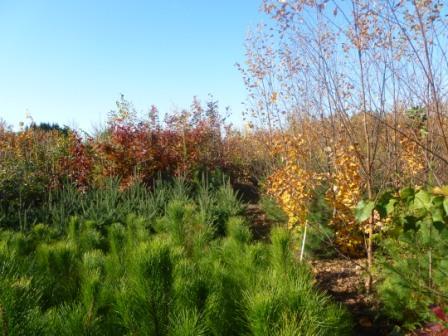
The biodiversity plantation of IDENT
Photo: Alison Munson
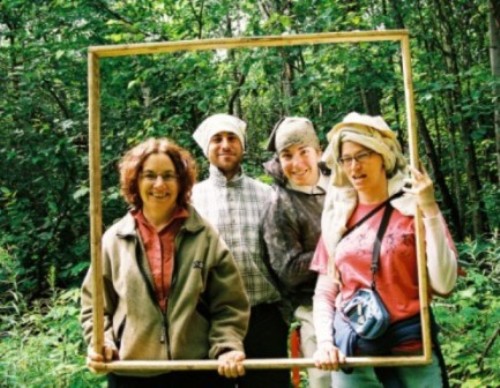
Quartet quadrat, Petawawa
Photo : Sophie Brugerolle
- Landscape value: a new input for forest management planning. Financed by FRQNT Fond Forestier (Partners for innovation program). (Nancy Gélinas PI, D Arseneault -UQAR, Y Boucher- MRN, S Déry - ULaval, J He - Sherbrooke, Munson, S Uhde - Institut de la Statistique Québec). Recruitment of a postdoc in spatial modelling.
- Evaluation of response of trees and understory plants of Gatineau Park to drought conditions. Financed by the National Capital Commission (Gatineau Park and Friends of Gatineau Park). PI Munson et L Bernier - U Laval, B Boulet et C Annecou, MSc candidate
- Restoration of natural capital : a demonstration in forest ecosystems of Charlevoix and Bas Saguenay. Financé par l'Institut en environnement, développement et société, U. Laval. (Munson, Déry, Gélinas)
- Working group on Ecosystem Services. Financed by Quebec Centre for Biodiversity Science. Directed by Paul Thomassin, McGill University.
- Functional Diversity: An ecological framework for sustainable and adaptable agro-forestry systems in landscapes of semi-arid and arid ecoregions. Financed by the 7th European Program. (Collaboration with l'Institut Sénégalais de la recherche agricole) Diatta Marone, PhD candidate (Alain Olivier, co-director)
- Exploring the black box: Coupling above- and belowground plant traits to understand disturbance effects on soil carbon storage in a temperate plantation. Financed by NSERC Discovery (Individual project). Rim Khlifa candidat PhD; Vincent Poirier, stagiaire postdoctoral.
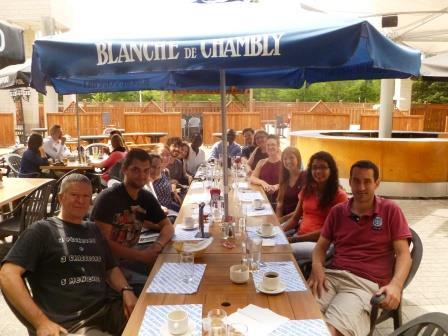
Lunch with team 2014 and CoVITAS
Photo: Gracious waiter
- IDENT: Theoretical and practical significance of tree species and functional diversity in designing novel forest ecosystems. Financed by NSERC Collaborative Research program (Christian Messier, Gravel, Munson, Shipley. Rim Khlifa candidat PhD.
PROJECTS RECENTLY COMPLETED
- Measuring and modelling carbon storage in black spruce ecosystems of Quebec under varying fire regimes. Financed by NSERC Strategic (Munson, Bradley, Cumming, Gauthier, Paré, Quideau, Waylishen, Mackenzie, Mouillot): Juliette Boiffin, PhD candidate; Sylvain Pelletier-Bergeron, MSc candidate (directed by Robert Bradley, U. Sherbrooke)
- Targets for ecosystem management and restoration of Quebec's deciduous forest using archives of land surveyor journals. Financed by NSERC Strategic (Dominique Arseneault, Doyon, Fortin, Grondin, Munson) Jason Laflamme, MSc candidate (co-directed par Pierre Grondin, Ministère des ressources naturelles et de la faune)
- Graduate course and international workshop on plant functional traits. Financed by FQRNT France-Québec. (Munson, Gachet, Shipley, Lechowicz, Aubin, Garnier, Navas, Reich)
- Potential capacity of naturally-deforested sites after reforestation in the continuous boreal forest. Financed by FQRNT Fond Forestier (Daniel Lord, Boucher, Côté, Munson) Maud Touchette, MSc candidate (directed by Jean-François Boucher and Daniel Lord, UQAC)
- Evaluation of ecosystemic silvicultural treatments to achieve objectives of biodiversity and productivity in the Mauricie region of Quebec. Financed by FQRNT Fond Forestier (Daniel Kneeshaw PI,Drapeau, Messier, Munson, Work)
- Characterization of the quantity and quality of soil carbon in plantation soils (part of an ongoing 20-year monitoring of a plantation ecosystem in the Great Lakes mixedwood forest). Funded by NSERC Discovery : Émilie Maillard, MSc 2009
- Restoration of Pinus strobus (white pine) in the context of a zoning exercise in the Mauricie region of Québec. Funded by an NSERC-Industry partnership (Christian Messier PI): Eduard Mauri-Ortuno, MSc 2010
- Ecophysiology of Ledum groenlandicum and Picea mariana under different environmental conditions imposed by variable harvest regime. Funded by the NSERC Industrial Chair – Silviculture and Wildlife (Jean-Claude Ruel, Chairholder): François Hébert, PhD 2010
- Adaptation of Canada’s forest industry to the context of climate change. Funded by the Network of Centres of Excellence in Sustainable Forest Management (Mark Johnston PI) Synthesis report published 2010.
- Disturbance ecology of boreal black spruce forests: Spatial and temporal dynamics of soil properties and vegetation after fire and harvest in black spruce forests. Funded by an NSERC Strategic and Discovery: Miren Lorente, PhD 2011
THEMATIC GRADUATE COURSES
- Species traits : an approach to understanding functional biodiversity, from organism to ecosystem scales - Sujets spéciaux en écologie et écophysiologie - FOR-7017
Offered April 2009, and 24-28th April, 2011, at Mont St-Hilaire: Détails ; Discussion forum for professors
; Discussion forum for professors
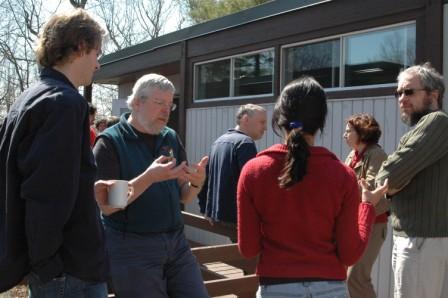
Traits 2009
Photo: Sophie Brugerolle
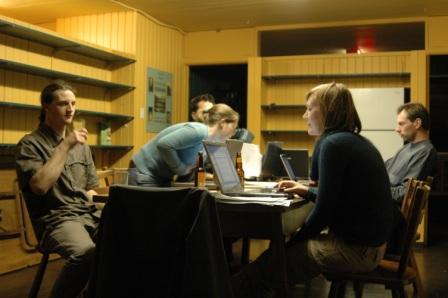
Traits 2009
Photo: Sophie Brugerolle
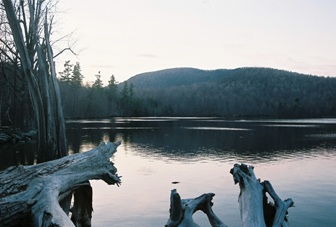
Traits 2009
Photo: AD Munson
- Écology and silviculture of ecosystems dominated by ericaceous shrubs - Sujets spéciaux en écologie et écophysiologie - FOR-66780
The objectives of this course are to introduce to graduate students 1) current knowledge of the structure and dynamics of the prinicipal ecosystems in North America and Scandinavia that are dominated by ericaceous shrubs and the mechanisms of plant interaction in these ecosystems; and 2)the current silvicultural approaches to tree regeneration and management of ericaceous vegetation in these systems. The course involves experts from elsewhere in North America and Europe who carry out research in this domain. Offered in May 2001 and 2004
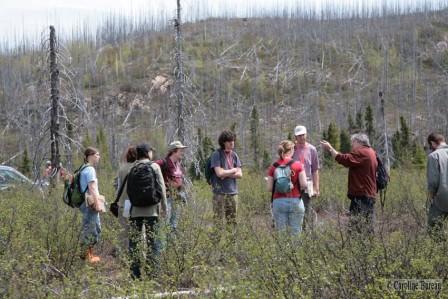
Photo : Caroline Bureau
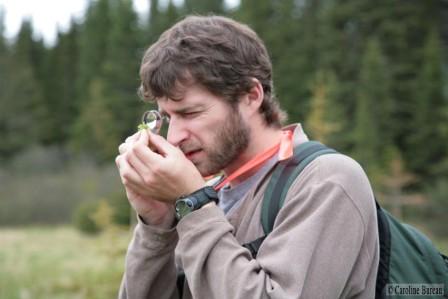
Photo : Caroline Bureau
- Mosses and Lichens of the Boreal Forest - FOR-67308
Co-responsable: Line Rochefort
Despite the discrete presence of these non-vascular plants in the boreal forest, they play an important role in the interception, cycling of nutrients and contribute to the fertility of these forests through associations with microbes. This role is all the more significant in considering that the boreal covers 58% of Canada's land area. This course for graduate students describes in detail this role within the dynamic of the boreal. Offered at the experimental forest of the Faculty of Forestry, Forêt Montmorency, the course involves lectures, field trips and laboratory work. At the end of the course the student will have acquired a solid understanding of the place of these plants and as well as techniques for identification of both bryophytes and lichens. Other specialists of boreal ecology and moss taxonomy contribute to a rich course. Offered in May 2005 and 2007
TEACHING RESPONSIBILITIES
- Ecosystem management of Quebec forests (Undergraduate, third year)
- Ecology and management of forest soils (Undergraduate, third and fourth year, optional)
- Forests and the carbon cycle (Undergraduate, in development, for autumn 2012)
- Ecosystem management: basic principles (Graduate and professional education; distance course)
- Mosses and lichens of the boreal forest (Graduate intensive field course)
- Special subjects in ecophysiology and ecology (Graduate intensive course)
ADMINISTRATION
RECENT PRESENTATIONS
- Boiffin,J., Mouillot, F. and Munson, A.D. 2014. Microclimate, burn severity and post-fire tree establishment affect predictions of long-term carbon dynamics in a boreal forest landscape. Joint meeting British Ecological Society and Société française d'écologie, 9-13 December, Lille, France.
- Munson, A.D., Gélinas, N., Déry, S., Arseneault, D., He, J., Uhde, S., Varady, H., Armstrong M. and Kerebel, A. 2014. A decision support tool for analysis of aesthetic value of regional landscapes in Quebec, Canada. Resilience Conference 2014. Montpellier, 4-7 mai.
- Munson, A.D. et Boiffin, J. 2014. Reslience of boreal species in a shifting disturbance regime. Invited conference, Semaine des sciences forestières, Colloque Kruger, le 29 janvier.
- Munson, A.D. 2013. Three green cities: increasing ecosystem services of urban forests. Invited conference, Forum de réflexion sur la recherche en développement durable, Fonds du recherche du Québec. le 2 juin, Chateau Frontenac, Québec.
- Munson, A.D. Restoration of natural capital in Charlevoix and Bas-Saguenay regions: an approach based on ecosystem services. Invited conference, Forum of the Institut en environnement développement et société and the Quebec Center for Biodiversity Science (QCBS), Biodiversity and sustainable development, at ACFAS, Quebec, May 8, 2013.
- Munson, A.D., Maillard, E. and Paré. D. 2012. Dynamics of soil carbon, nitrogen and microbial biomass during 20 yrs of succession towards deciduous or conifer canopy in sub-boreal plantations. Symposium 10.03: Tree species influence on forest soils. Eurosoil 2012, July 1-5, Bari, Italy.
- Bahn, M. et al. 2012. Organization and participation in symposium BG2.15 Biotic interactions and biogeochemical processes, European Geophysical Union, April 22-27, Vienna. Co-convenors: M. Bahn, R. Bardgett, C. Preston, S. Quideau, M.Reichstein.
- Munson, A.D. 2012. Participation and presentation of Project C*FIRE: Measuring and modelling carbon storage in black spruce ecosystems of Quebec under varying fire regimes, at the NSF Centre NIMBios Investigative workshop: Disturbance Regimes and Climate-Carbon Feedback, Knoxville, Tennessee, February 12-15.
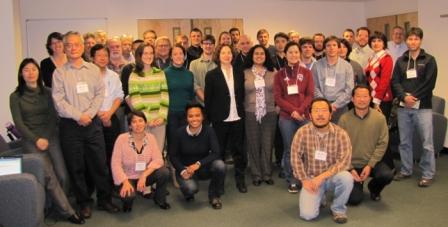
NIMBios group: Disturbance and Carbon
- Munson, A.D. 2011. Temporal dynamics of C and N cycles after disturbance: a short story of a long term study. Invited conference, Université de Sherbrooke, January 14, 2011.
- Munson, A.D., Maillard, E. and Paré, D. 2010. Shifts in microbial biomass indicators track changes in carbon and nitrogen cycles during tree plantation development to 20 years. Oral presentation in B34B: Integrating Recent Knowledge of Soil Carbon to Help Develop Process-Based Soil Carbon Models. Annual meeting, American Geophysical Union, San Francisco, 14-17 December.Résumé

- Munson, A.D. 2010. Ecosystem management in a post-Kyoto world: how can one manage change? Congrès de l’Ordre des ingénieurs forestiers du Québec. Université Laval, October 22-24. Présentation

- Munson, A.D., Yamasaki, S. 2010. Donner une valeur monétaire aux services des écosystèmes : une capitulation face aux marchés? Colloque du Congrès annuel de l'ACFAS (Association francophone pour le savoir). Université de Montréal, 10-14 mai. Résumé

- Munson, A.D. 2010. Aménagement écosystémique: paradigme du futur ou du passé? Atelier international de formation sur la thème : Nouer les liens entre l’écoagriculture, l’écoforesterie, la biodiversité et les changements climatiques dans le bassin du Congo. Libreville, Gabon. 4-7 janvier.
- Munson, A.D., Maillard,E., Paré, D. 2009. Soil carbon quantity and quality twenty years after establishment of temperate Great Lakes conifer plantations. Congrès: Carbon in Northern Forests, Traverse City, Michigan. 10-11 juin. Présentation

- Munson, A.D. 2009. Gaps in boreal black spruce function: what do we need to know urgently? Conférence invitée, Dép. biologie, Lakehead University, Thunder Bay, Ontario. 13 mars, 2009.
- Munson, A.D. 2009. The Forest Ecologist who Never Grew Up. 19 janvier 2009. Sciences Career Day, Quebec High School, Québec.
- Munson, A.D. 2008. Le contexte Nord-Sud de la séquestration du carbone dans les écoystèmes forestiers. Séminaire sur REDD (Reducing Emissions from Deforestation and Degradation), organisé par l'Institut d'Environnement Développement et Société et le Centre d'Étude de la Forêt. 21 novembre, Université Laval. Présentation

WHO AM I? WHAT DO I DO FOR FUN?
I grew into ecology by spending my entire childhood outdoors without anyone looking after me. My clan of three brothers and I roamed uncontrolled into streams, forests, hedges, barns and whatever got in our way. On his day off, my father took us hiking, for a change, or got us lost on county backroads with grass growing up the middle. I recommend these methods highly to instil a love of nature.
After deciding I couldn’t save whales because I hated dissection (maybe wrong but too late now), I did my undergrad work at Guelph University in Natural Resources Management, specializing in soil science (with the best soils guys in the world). Then I worked in forest soil inventory and forest ecosystem classification in northern Ontario for five summers at least, building up immunity to black flies and graduating to crew leader and soils inventory teacher. Realizing I was more ambitious than this, I went back to school at University of Toronto, spending another four years with black flies and clay soil, but much more knowledgeable for it. This was followed by a postdoctoral fellowship at Université Laval; during these two years I fell in love with a white pine plantation, where I am still working 20 years later, and learned to speak French. But I have not left the black spruce of my PhD behind and can still be found in boreal forests across Québec and Ontario with my grad students, trying to figure out how these ‘simple’ systems work.
I am mainly focused on biogeochemistry of forest ecosystems, but ever a generalist, have interests that range from this central focus of my work. I am interested in how natural and anthropogenic (harvest, silviculture) disturbances affect ecosystem function, and use different tools to evaluate changes: modelling with my modeller friends, geostatistics, and even traditional statistical methods. I try hard to follow different forests in the long term; I have learned much by going back to the same site every year for 20 years, and the same black spruce forests for the same length of time. I respect modelling but love the field. More recently I have succumbed to climate change work, rather alarmed by our future prospects; this has led to an obsession with carbon sequestration mechanisms in forest soils.
RECENT FINDINGS
More to come....
PUBLICATIONS
<< Miguel Montoro Girona | MembresReguliers | Alain Paquette >>








